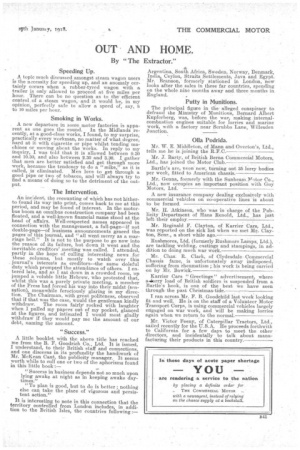OUT • AND HOME.
Page 17

If you've noticed an error in this article please click here to report it so we can fix it.
By "The Extractor."
Speeding Up.
A topic much discussed amongst steam wagon users is the necessity for speeding up, and an anomaly certainly occurs when a rubber-tyred wagon with a trailer is only allowed to proceed at five miles per hour. There can be no question as to the-efficient control of a steam wagon, and it would be, in my opinion, perfectly safe to allow a speed of, say, 8 to 10 miles per hour.
Smoking in Works.
A new departure in sortie motor factories is apparent as one goes the round. In the Midlands recently, at a good-class works, I found, to my surprise, practically every workman, no matter of what degree, hard at it with cigarette or pipe whilst tending machines or moving about the works. In reply to my inquiry, I was told that it is allowed between 9.30 and 10.30, and also between 2.30 and 3.30. I gather that men are better satisfied and get through more work, because the tendency to do a "mike," as it is called, is eliminated. Men love to get through a good pipe or two of tobacco, and will always try to find a means' of doing so to the detriment of the output.
The Intervention.
An inc:derrt, the recounting of which has not hitherto found its way into print, comes back to me at this period, and may be found of interest. In the motorbus boom an omnibus construction company had been floated, and a well-known financial name stood at the head of affairs. Well-respected names appeared in connection with the management, a full-page—if not double-page—of business announcements graced the pages of this journal, and "all went merry as a marriage bell." It is not to the purpose to go now into the reason of. its failure, but down it went and the inevitable creditors' meeting was called. I attended, partly in the hope of culling interesting news for these columns, but mostly to watch over this . journal's interests as creditors—the same doleful duty which prompted"the attendance of others. I entered late, and as I sat down in a crowded room, up jumped a voluble little Hebrew, who protested that, whilst this was a purely private meeting, a member of the Press had forced his way into their midst (sensation), meanwhile ferociously glaring in my direction. The Chairman, with great politeness, observed that if that was the case would the gentleman kindly withdraw. The room 'fairly rocked with laughter When I pulled my papers out of my pocket, glanced at the figures, and intimated I would most gladly withdraw if they would pay me the amount of our debt, naming the amount.
"Success."
A little booklet with the above title has reached me from the B. F. Goodrich Co., Ltd. It is issued, I understand, to their British staff and connections, and one discerns in its profundity the handiwork of Mr. McKean Cant, the publicity manager. It seems worth while to cull one or two of the aphorisms found in this little book:— " Success in business depends not so much upon lying awake at night as in keeping awake daytimes."
"To plan is good, but to do is better ; nothing else can take the place of vigorous and persistent action."
It is interesting to note in this connection that the territory controlled from London includes, in addition to the British Isles, the countries following :— Argentina, South Africa, Sweden, Norway, Denmark, India, Ceylon, Straits Settlements, Java and Egypt. Mr. Branson, formerly stationed in London, now looks after the sales in these far countries, spending on the whole nine months away and three months in England.
Putty in Munitions.
The principal figure in the alleged conspiracy to defraud the Ministry of Munitions, Bernard Albert Kupferberg, was, before the war, making. internalcombustion engines suitable for forries and marine work, with a factory near Scrubbs Lane, Willesden Junction.
Ofla Podrida.
Mr. W. E. Middleton, of Mann and Overton's, Ltd.,
tells me he is joining the R.F.C.
Mr. J. Barty, of British Berna Commercial Motors,
Ltd., has joined the Motor Club. BartIe's are, -even now, turning out 35 lorry bodies
per week, fitted to American chassis.
Mr. Genna, formerly with the Sunbeam,Yotor Co., Ltd., now occupies an important position with Guy Motors, Ltd.
A new insurance company dealing exclusively with• commercial vehicles on co-operative lines is about
to be formed Mr. H. Atkinson, who was in charge of the Publicity Department of Hans Renold, Ltd., has just
left their employ. Mr. Reginald F. Clayton, of Karrier. Cars, Ltd., was reported on the sick list when we met Mr. Clayton, Senr., a short while ago. • Rushmores, Ltd. (formerly Rushmore Lamps, Ltd.), are tackling welding, castings and stampings, in ad dition to doing much war Work.
Mr. Chas. R. Clark, of Clydesdale Commercial Chassis fame, is unfortunately away indisposed, suffering from rheumatism ; his work is being carried
on by Mr. Bowick. Karrier Cars " Greetings " advertisement, where a.lporry load of British soldiers is suspended from a Bartle-s hook, is one of the best we have seen
through the past Christmas-tide.
I ran across Mr. F. B. Goodchild last week looking fit and well. He is on the staff of a Volunteer Motor Transport Corps, is using commercial vehicles largely engaged on war work, and 'will be making lorries
again when we return to the normal.
Mr. Victor Feeny, of Caterpillar Tractors, Ltd., sailed recently for the U.S.A. He proceeds forthwith to California for a few days. to meet the other directors, and incidentally to talk about manu
facturing their products in this country.
























